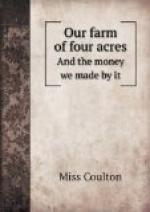We were not so fortunate with the ducks. We did not keep any through the winter, consequently we had to purchase the eggs, which were placed under hens; for those eggs we paid four cents each, and out of thirteen, which was the number given to each hen, we never reared more than eight ducks.
Thus, in the first instance, they cost us six cents each; and they were likewise more expensive to feed than the chickens. They were never fit for the table till they had cost us sixty-three cents the couple. One reason of this was, that as the chickens had all the waste bids, they had nothing but what was bought for them; but then they were such ducks as could not have been purchased at the poulterers’.
We never killed one unless it weighed four pounds; they used to be brought in at night, and placed in the scale: if it was the weight I have mentioned it was killed, if not it was respited till it did so.
At first we tried cooping them to fatten, but found it did not answer, as they moped and refused to eat by themselves; so we abandoned that plan, and were content to let them run in the meadows till fit to kill, which was not till they were three months old. They were never “fat,” but very meaty, and fine flavored,—not in the least like those which are bought, which, however fat they may appear before they are cooked, come to table half the size they were when put down to the fire.
I remember being rather puzzled once when resident in London. I wanted a particularly fine couple of ducks for a “company dinner,” and went myself to the shop where I dealt to order them.
“Now, Mrs. Todd,” said I, “the ducks I require are not fat ducks, but meaty ones; the last I had from you had nothing on them when they came to table, though they looked so plump when you sent them.”
“Oh, yes, ma’am,” was the rejoinder. “I know just what you want; but they are very difficult to get: you want running ducks.”
I was obliged to ask what she meant by the term running, and was then informed that the ducks for the London market were put up to fatten, and as they were crammed with grease to hasten the process, the fat all went into the dripping-pan. Now a running duck was one well fed, and allowed to roam or run till it was killed. I am now able from experience to say, that they are incomparably superior to their fattened brethren.
The novice in poultry-rearing must be told that it is almost useless to set a hen in very hot weather. As we had more eggs than were required, we did so during part of June, July, and August, but had very bad fortune with them; the hen seldom hatching more than three or four, and those puny little creatures.
There is an old Kentish proverb which says,
“Between the sickle and the scythe,
Whatever’s born will never
thrive;”
and as it was just between the hay and corn-harvest that we tried to rear our ducks and chickens, I am induced to believe that, like many other old saws, it was founded on experience. They may be reared in September, though they require great care, and must not be allowed to run on the grass, which at that season is seldom dry.




